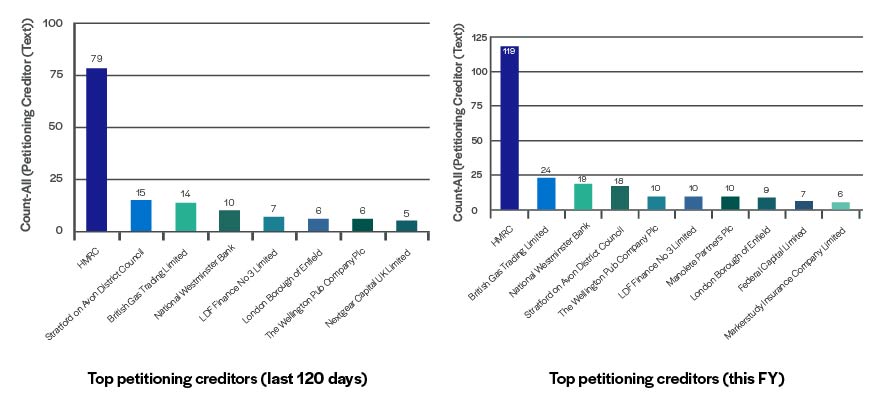
HMRC – taking a stand on unpaid tax
HMRC – taking a stand on unpaid tax
Bankruptcy petition statistics
Since the start of the Covid-19 pandemic, we have all read about the impending “wave of personal insolvency” due to hit the UK, however, this has not been seen in the number of bankruptcy orders.
Prior to the pandemic, creditors’ bankruptcy petitions were regularly in excess of 3,000 per year. Understandably, during the pandemic, these creditor-led bankruptcies dropped to 1,000, however, this trend did not immediately increase when lockdown lifted. The exceptional circumstances of the pandemic rightly resulted in creditor forbearance, giving individuals and the wider economy chance to recover.
Since the pandemic, the country has faced energy price hikes, increased interest rates and a cost-of-living crisis, making debt management an ongoing issue for businesses and the indebted.
Bankruptcy petitions have recently started increasing, a trend expected to persist. An analysis of the creditor petitions issued in the last 3 months, and in the financial year to date, show clearly which creditor is taking the lead in petitioning again.
Petitioning for bankruptcy is an effective enforcement tool, with around one third of debts being paid on presentation of a petition.
If creditors do their due diligence on the recoverability of the debt from subsequent asset recovery, the return justifies the initial costs of the petition. The petitioning creditor’s cost will take priority in the resulting bankruptcy estate.
HMRC are now leading the way in seeking repayment of debts, petitioning on over 50% of all creditor-led bankruptcies in the year to date.
The impact of the pandemic
During the pandemic, many staff in the insolvency departments at HMRC were redeployed to assist with the additional needs of the country at the time. As a result, years of unpaid tax have now accrued, and the statistics show that HMRC are making good on pursuing these now.
Recent trends show HMRC are taking a strong view against people with large debts and those taking part in tax evasion schemes.
So called “high-net-worth” individuals appear to be another major area being targeted by HMRC.
HMRC’s position
HMRC have not publicly commented on their increased activity. It is difficult to determine whether they are petitioning as a punitive measure and a deterrent to others, or whether some investigation into recoverability is being undertaken.
Personal vs corporate insolvency
HMRC are also the biggest petitioners for winding up orders against companies.
Over half of director disqualifications from April 2022 to June 2023 were connected to the abuse of pandemic support programs, particularly Bounce Back Loans. With director conduct being under heightened scrutiny, it follows that many winding up orders could also lead to the directors themselves facing bankruptcy orders or compensation orders.
If you receive a statutory demand
Should you receive a statutory demand, either as a company director, or as an individual, do not ignore it. HMRC have shown they intend to follow through and pursue their claims. Take advice, contact HMRC and engage with the process.

